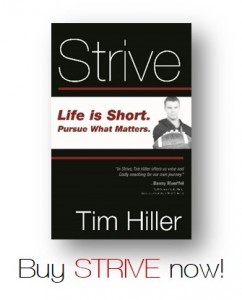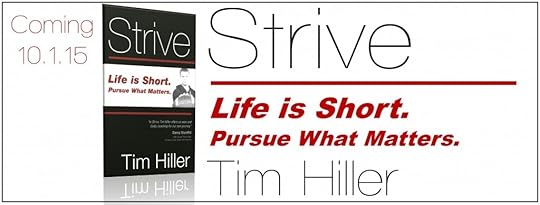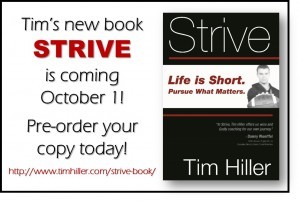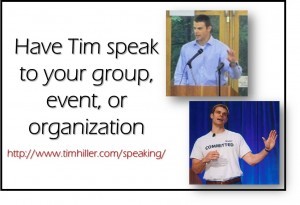Tim Hiller's Blog, page 3
August 23, 2015
STRIVE…to Sacrifice
The release of Tim Hiller’s new book Strive is coming October 1! To get ready for the Strive release, we’re introducing “The Strive Challenge” – 6 weeks with 1 purpose – to help readers pursue what matters most in their lives. Join in at: https://www.timhiller.com/the-strive-challenge/
CLICK HERE to download and complete today’s Strive Challenge Tracker!
Then he said to them all: “Whoever wants to be my disciple must deny themselves and take up their cross daily and follow me. For whoever wants to save their life will lose it, but whoever loses their life for me will save it.
Luke 9:23-24
During my second year as a head football coach we began a new practice: we waited to vote for team captains until we had a week of practice under our belts. Why? We wanted to answer a key question:
Who wants to lead the most?
After selecting our captains during that second week of practice, I always held a meeting with our appointed leaders to outline the six pillars of being a captain in our program:
Compete: Captains must compete to be the best in all areas of their lives.
Heart: Captains are passionate and excited about what they love.
Attitude: A captain’s attitude is positive at all times, no matter what. Everyone is watching how you handle yourself.
Inspire: Captains are not only self-motivated within, but they also inspire those around them to greater heights.
Perform: Captains can be relied upon to come through when the team needs them to step up the most.
Up until this point in the conversation, the room was always filled with lots of smiles and head nods…until we reviewed the sixth and final pillar. Sacrifice.
Sacrifice: Captains are servant leaders—they serve others around them while they lead, even if it is inconvenient.
As our young men looked up at me with inquisitive looks, I asked them to read aloud the following two bullet points, outlining what sacrifice tangibly looked like in our program on a daily basis:
LOVE is spelled T-I-M-E. Even when it is a hassle, you have to be willing to show your teammates you care and will do whatever it takes for them. The best ability is availability.
Captains in our program serve their teammates. This goes beyond encouraging words….our captains carry the ball bags, equipment, and water each day. Our captains listen to teammates’ problems. Our captains go above and beyond for the brotherhood.
Up until that point in my life, every football program I’d ever been a part of was about seniority, not service. Sophomores carried the water and equipment, seniors ordered them around. A coming of age meant more bossing around and less busy work. Admittedly, I ran my program this way my first season as a coach. It was what I had always been accustomed to. But then it dawned on me during my first off-season—I was training our senior captains to be served, not to serve. The exact opposite of true leadership.
As a coach, the sixth pillar of sacrificial service showed who really wanted to be a captain and who just liked the idea of it. A life of meaning is about sacrificing for the good of others. We all have things we want. Things we are striving for and pursuing. But we find out just how badly we want the object of our pursuit when it comes time to give something up for it.
I believe a relationship with Jesus Christ is the most important thing we can pursue—in this life and the life to come—but, just like my young captains, it requires “want to.” And then it requires sacrifice. In Luke 9, Jesus walks us through the cost of living sacrificially for him.
Desire – “Whoever wants to be my disciple…”
Faith in Christ starts with a fixed desire on him. Jesus is addressing “whoever wants to be” one of his disciples. Half-hearted devotion will not last very long in the throes of life’s many challenges. He is the anchor for our hearts and lives.
Denial – “…must deny themselves…”
When I was a little boy, I used to dream about the day I could sit in the front seat of the car with my mom. But alas, I had to sit in the backseat until I was twelve years old! Denial of self is willingly sitting in the backseat of life while Jesus drives the car. He knows the way, we must trust and obey!
Discipline – “…take up their cross daily…”
For Jesus, carrying the cross up the Golgotha hill was a step-by-step struggle. So much so that Simon of Cyrene was forced to assist him. (Luke 23:26) What inconvenience, adversity or challenge is God asking you to take on each step of each day to mold and shape you?
Doing – “…follow me…”
Following is about doing as the leader does. Jesus is calling us toward a life lived in his image—filled with love and selfless sacrifice. Our external actions reveal our internal desires. Are you willing to do his will above your own?
Yes, the price of following Jesus is high, but the price Jesus paid on our behalf is higher. His sacrifice was the ultimate one—losing his life—so that you and I can keep ours eternally in his Heavenly presence. Is he your desire? Are you willing to deny and discipline yourself to do his will? This week let’s work to sacrifice for the good of others and for God’s glory as we pursue a deeper relationship with his son Jesus!
CLICK HERE to download and complete today’s Strive Challenge Tracker!




The Strive Challenge™ by Tim Hiller
August 17, 2015
Our God’s Not Dead
But in your hearts revere Christ as Lord. Always be prepared to give an answer to everyone who asks you to give the reason for the hope that you have. But do this with gentleness and respect, keeping a clear conscience, so that those who speak maliciously against your good behavior in Christ may be ashamed of their slander.
1 Peter 3:15-16
It’s no secret that I love football. One of my fondest memories growing up was staying up to watch Monday Night Football. Well…the introduction that is. As a child, my parents used to let me stay up just late enough to hear Hank Williams Jr.’s rendition of the Monday Night Football theme song before bedtime. I used to sit on the floor by the speakers of the television with my Playskool brand tape recorder and record the song in its entirety, play it a couple times, and then sleepily head upstairs. (By the way HERE is the tape recorder on eBay if you have no idea what I’m talking about. The item title says “vintage”…boy do I feel old now!)
It was here on the family room floor that I admired the likes of Al Michaels, Dan Dierdorf, and one Frank Gifford. An eight time Pro Bowl player, Gifford was named to the game’s high honor from three different positions: running back, wide receiver, and defensive back, something unheard of in the game today. Despite my admiration from a childhood distance, I knew little about Gifford’s life…until just recently.
Did you have the chance to Kathie Lee Gifford’s tribute to her late husband on the Today show? If not, you need to take the 9 minutes and watch it below:
In a day in age where watching day time television or the news floods our homes with violence, political nonsense, and eroding societal values, Kathie Lee moved me to tears with her faithful witness for her and her husband’s faith in Jesus. On national, live television.
All I could think was: Our God’s Not Dead.
You see, you and I are each given four things. And I believe the measure of our lives before our Heavenly Father one day will be what kind of steward we were with these four things.
People
In our lives, we each come into contact with certain people that only we can impact. Our paths cross for a divine reason. Only we can say the right word, or smile at the right time, or offer the right consolation.
Possessions
We each are given things on loan for a period of time. Might be our dwelling, or vehicle, our clothes, or our food. But how we use these things says a great deal about where our faith lies.
Places
We each are put in certain places for certain seasons of life. Where we work, where we live, where we shop, where we work out, where we eat…all of the places our paths take us are opportunities to leave them better than before we arrived.
Platforms
A platform is simply a position of influence that can be used to make a positive difference. In short, it’s our voice. Our credibility. We each have platforms at work, at school, at home, in our communities, at church, and more. When you have a platform, people are watching and listening. And what we share from that platform of influence matters.
1 Peter 3:15-16 outfits us with a simple directive for how to make best use of the people, possessions, places, and platforms in our lives:
“Always be prepared to give an answer to everyone who asks you to give the reason for the hope that you have.”
When people look to you for support, share your hope in Jesus. When faced with a decision about how to use your possessions, consider what your decision says about your faith in Jesus. When you enter a place God has put in your life, do those there know what you believe about Jesus? And when you seek to use your platform, use it to share what Jesus has done in your life.
Thank you Kathie Lee for using your platform to share your faith and for exemplifying how to give the reason for the hope that you have.
August 16, 2015
Introducing the Strive Challenge
The release of Tim Hiller’s new book Strive is just 52 days away! To get ready for the Strive release, we’re introducing “The Strive Challenge” – 6 weeks with 1 purpose – to help readers pursue what matters most in their lives. Here’s how it works:
1. Subscribe to The Strive Challenge HERE or by visiting https://www.timhiller.com/the-strive-challenge/
2. Starting Monday, August 24th (for 6 consecutive Mondays) read The Strive Challenge in your email inbox or at http://www.timhiller.com/blog/
3. Complete The Strive Challenge Tracker each week to see your progress
4. Continue the journey by getting your copy of Tim’s book Strive HERE or on Amazon
Subscribe today, share The Strive Challenge with others, and get ready for Strive coming October 1!
The Strive Challenge™ by Tim Hiller
August 9, 2015
Introducing The Strive Challenge
The release of Tim Hiller’s new book Strive is just 52 days away! To get ready for the Strive release, we’re introducing “The Strive Challenge” – 6 weeks with 1 purpose – to help readers pursue what matters most in their lives. Here’s how it works:
1. Subscribe to The Strive Challenge HERE or by visiting https://www.timhiller.com/the-strive-challenge/
2. Starting Monday, August 24th (for 6 consecutive Mondays) read The Strive Challenge in your email inbox or at http://www.timhiller.com/blog/
3. Complete The Strive Challenge Tracker each week to see your progress
4. Continue the journey by getting your copy of Tim’s book Strive HERE or on Amazon
Subscribe today, share The Strive Challenge with others, and get ready for Strive coming October 1!
The Strive Challenge™ by Tim Hiller
July 5, 2015
Steady in the Storm
I’ve often thought about leadership strength like a maritime anchor. Unrelenting, iron clad, and too heavy to move, the anchor secures a boat firmly in place, swayed only as far as its chain will allow. But as I observe the ever shifting sand of our society, I realize that the anchor, though strong and steadfast, isn’t the best picture of today’s leadership requirements.
For leaders in all walks of life—it’s no secret. We are living and leading in turbulent, changing, and often scary times. Just a sixty second glimpse of any major news network is enough to shake the foundation of any human being.
While it seems the only constant is change, as leaders, one thing will always remain unchanged. It is our first and foremost duty to be good stewards of the people entrusted to us. In whatever setting we’ve been placed, the legacy of our leadership is ultimately defined by how well we care for the people and resources placed under our control for a period of time.
The Anchor or The Keel?
As we navigate a 21st century filled with technology, rapid change, instant gratification, and diverse beliefs, allow me to offer a new picture of the kind of steady leadership we need in our stormy world. It’s an image of steadfast guidance I found, like the anchor, in a nautical place—on a sailboat.
Now, truth be told, I know how to swim, but I’m not a big fan of water. Especially choppy water filled with white-capped waves. But on this particular day I let myself get talked into venturing out from shore. I put on my brave face, I acted enthused, but I was scared to death!
It was a windy day—perfect for sailing, not for my nerves. As we pushed away from shore the wind quickly took hold and we found ourselves skipping across the water like a smooth stone thrown over the surface of a pond. As our voyage progressed I did everything I was told to do—pull this rope, crank that handle, adjust the sail—partially because I had no idea what I was doing, but namely because I didn’t want to die!
The scariest thing moment of the sail was when the boat rocked and leaned. I was hanging on for dear life, leaning back with all my weight, my head and shoulders nearly skimming the waters as we flew across the blue surface. But amazingly, no matter how far we leaned, we never capsized. We never turned over, we never flipped, we never toppled into the violence of the waves.
Why? How was that possible?
There was nothing visible on the boat that could’ve kept us right-side-up. Nothing that caught the eye that had the ability to secure the ship. But it was when we pulled the boat up out of the water that I learned the source of steadiness.
Under the boat was a deep, long, heavy fin that protruded down into the water called the keel. It acted as a counter balance—a safety weight—that opposed the shifting of the wind and waters. When I felt like we were going down, the keel balanced our vessel out. And when I felt like we were going to fly up in the air, the keel brought us back to equilibrium.
But perhaps the thing most amazing, yet powerful, thing about the keel is that it’s hidden from plain sight. It’s below the surface of the water. Boarding the boat, you don’t even know it’s there. But when the storm hits and the chaos engulfs the craft, this hidden feature keeps the boat stable and safe, even through treacherous turbulence.
It’s the keel that keeps a boat steady in the storm.
An anchor, though secure and strong, keeps a vessel on the shore or in the harbor. A keel accompanies the vessel into the waters, no matter how choppy. An anchor buries itself in the sand and prevents motion. A keel stays afloat with the boat and provides stability. An anchor is separated from its ship. A keel is inseparably and intimately connected to the ship’s hull.
As leaders in these times, we need a life’s keel. We need something that secures our identity as people, so that when the tempest strikes—our beliefs are challenged, our plans change, our team faces trial or tragedy—we don’t tip over and crash. But something that isn’t necessarily external or visible like a tattoo or a t-shirt. Something deep within us. Something that others maybe can’t put their finger on, but they can see a difference beneath the waters of our lives. They see how we conduct ourselves, despite the uncertainty all around, and ask: “Why isn’t he crumbling?” “How can she handle this adversity so well?” “What’s different about them?”
So what’s your keel?
I’ve sought leadership steadiness in a variety of places—books, podcasts, mentors, conferences, trainings, my own self-confidence—and while all have benefit and value, I’ve only found one thing that always accompanies me in choppy water, always stays afloat and provides stability, and that is inseparably and intimately connected to my life. My leadership keel is Jesus.
2 Timothy 3: 14-15 (NLT) speaks of the source of steadiness that we can find in the eternal keel of Christ:
“But you must remain faithful to the things you have been taught. You know they are true, for you know you can trust those who taught you. You have been taught the Holy Scriptures from childhood, and they have given you the wisdom to receive the salvation that comes by trusting in Christ Jesus.”
Steady, even-keeled leadership is simply about being “faithful to the things you have been taught” in any and every situation. Times may change, but timeless values do not. And timeless leadership values—sacrificial love, selfless service, and confident humility—find their origin in the wisdom of the Holy Scriptures, where Jesus exemplified a life lived by these tenets.
Leadership steadiness is peace in the midst of pressure. It is clarity in the throes of chaos. And it is possible for leaders in today’s turbulent world when we fasten our life’s vessel to the lasting keel of Christ. He is our lasting steadiness in any storm.
 Tim’s book STRIVE is coming October 1, 2015! Pre-order your copy today!
Tim’s book STRIVE is coming October 1, 2015! Pre-order your copy today!
June 8, 2015
Building The Complete Person
“For physical training is of some value…” 1 Timothy 4:8
He leaned forward and slid the piece of paper toward me with two hands and then leaned back in his chair again, folding his arms across his chest. Finally he broke the awkward silence by dropping a bomb.
“Tim…we’re going to have to let you go.”
Just like that, in a moment, it was over. Years of bobbling around the backyard in JC Penney catalog football uniforms, years of cutting out Sports Illustrated for Kids magazine pictures, years of getting up before the sun to lift, run, throw, and watch film, years of playing the game I love. In a moment it all came to a close.
We don’t like to talk about it, but that same moment is coming for every single athlete who sets foot on a track, mat, court, rink, or field. Sooner or later, it’s going to end. Every athlete who has entered the arena of competition, at any level, will spend the majority of their lives being something other than an athlete.
The NCAA estimates that in six of the most sought after collegiate sports there are over 3 million high school competitors. Across those six sports, just 6.25%, or a little over 187,000 student-athletes will continue their career beyond high school. And of these 187,000 fortunate enough to compete at the college level, only 3.42%, or just fewer than 5,000 athletes, will compete professionally.
With the options available in youth, scholastic, and travel athletics today, competing is often taken for granted as a right rather than a privilege, but being an athlete is far from something one is entitled to. The opportunity to be an athlete is a wonderful gift that is fleeting, short-lived, and if done well, an incredible chance to prepare for success in life.
At Next Level Performance our coaches and support staff are equipped and committed to help every athlete with aspirations of being a part of the 6.25% or the 3.42% achieve their dreams. Our talented team has competed at the highest levels and we know the path to success. But as we relentlessly help all our student-athletes pursue their goals, we do so with a higher ambition surrounding all we do.
Building the complete person.
While every single student-athlete has unique gifts, talents, skills, and personalities, all have three things in common. Each was created with a body, a mind, and a spirit, which we like to call “the heart.” These three elements of a human being – physical, mental, and heart – shape all that we are and all that we do in our lives.
Every time an athlete enters training or competition, the task at hand has them captured physically as they exert themselves toward the prize of running, kicking, throwing, catching, swinging, or jumping. The task at hand also has them captured mentally as they focus their minds on learning a new skill, reacting to an opponent, or adjusting to a change in conditions.
But body and mind are only two-thirds of the equation. What about the heart? What about the whole person? How do we impact the trajectory of a life, not just the temporary success of an athletic career?
Herein lies the opportunity being seized by Next Level.
While we have an athlete’s captive attention mentally and physically, we are adding the third and most crucial part of each athlete into their training and preparation. We are capturing their heart. How?
We believe finding purpose and building leadership starts with looking in, and then proceeds and grows by looking out. Every performance training session, sport-specific training session, travel team practice, and Beyond The Game conference includes a journey through the Next Level Leadership model. The model consists of three phases, which are integrated into all our services for student-athletes:
REFLECT
This first vital phase invites the student-athlete to discover who they truly are, what unique gifts and talents they possess, and what passions they have where they can apply their gifts and talents to make a difference.
DIRECT
The second phase is about setting direction. Based on who I am and what I love to do, what are my goals? How can I use my skills to serve others? Where do I want to go and how can I start moving in the right direction to get there?
CONNECT
The final phase is about influencing and leading others. All leadership begins with self-leadership, but the leaders who make a lasting difference impact the lives of others. How do I communicate effectively to earn followers? How do I live in a contagious way? How do I bring others along with me and lead in my team, my school, my family, my community, and beyond?
Physical training is of some value indeed (1 Timothy 4:8), but it’s only part of the equation. Every athlete has a purpose beyond the game and by using the platform of athletics to unlock and discover this purpose, we are building Next Level Leaders that are complete people—equipped to succeed on the field now, and off it for years to come!
May 17, 2015
The Power of “YET”
Performance approach: The performance approach takes on a near-term focus. ‘Learn just what you need to get the good grade and be done.’ This creates a goal of learning for the sake of achievement or doing something for a short-term outcome.
Mastery approach: The mastery approach takes on a long-term focus. The goal is learning for the sake of deep understanding and getting better. It’s instilling in students a desire to make sure that they understand a skill or topic as best they can.
The challenge we see with the performance approach is that when a student does not get an A or win a game, they count it as failure. It tends to discourage them and seep into their self-definition and worth. While on the contrary, the mastery approach always takes on the long term view of “Let’s learn from this” and pushes the student to continue to grow. A mistake is not a failure unless it is repeatedly repeated—and every day, every class, every training session, and every game is an opportunity to grow and get better. The mastery approach is all about embracing the process and enjoying the journey each step of the way.
In his best-selling book Drive, author Dan Pink outlines that all of us are looking for three things as we work and pursue our goals—autonomy (being self-directed), mastery (improving at something important to us), and purpose (knowing that what we do matters). At Next Level, we are seizing the opportunity to help athletes master their craft—improving at something important to them—their sport—and while we work, we are helping them discover their purpose—building a deep understanding that they matter as people and can use their gifts and talents to benefit and serve others around them.
It is here, in the midst of this mastery approach, that we unlock the power of the word YET.
As we challenge our Next Level athletes to grow on and off the field, we encourage them to realize that they are well on their way to fulfilling their potential—but they are not there YET. They are on a journey of life, and working for an athletic goal and growing as a leader—these are steps in the process of that journey. We want to push every athlete to learn from every experience, and to carry those lessons forward on their path toward becoming a better student, athlete, leader, and person.
Great research by Dr. Carol Dweck shows that when students believe they can improve and grow—they learn faster, learn more, and have a positive experience along the path of growth. At Next Level Performance, it is our goal to harness this belief and instill it in every athlete we have the honor to work with.
There is greatness within every Next Level student-athlete, they just aren’t there YET…and each day they are taking more steps to fulfilling their purpose and becoming all they are destined to become!
CLICK HERE to view Next Level Performance’s Summer 2015 Training Guide!
April 26, 2015
Humility is Confidence
I had a wonderful opportunity to share my thoughts on humility in the “leadership corner” of my team’s employee newsletter at work. I thought I’d share it with you as a new week begins.
We all need to be reminded from time to time that there is no more powerful posture we can assume in this life than one of humility and service.
Serve well this week!
-Tim Hiller
Seconds remained in the 2002 district semi-final basketball game as a scrawny freshman stepped to the free throw line. His twig-like arms bounced the ball three times as he gazed toward the basket. It all came down to this. He raised the ball and released it toward the rim.
Clang. Off the back of the iron. Season over.
As I dejectedly walked through the dark gym to the bus after my charity stripe failure, the silence was broken by the voice of my teammate’s uncle.
“You’re the man,” he said.
“I don’t feel like it right now,” I replied.
“But you’ve got to believe it,” he fired back. “From now on, when you step to that line, you tell yourself, ‘I’m the man, this is why I’m here.’ But you never tell anyone else.”
Humility gets a bad rap in our society today. When we hear the word humble we think lowly. We think trampled upon. We think loser. But nothing could be further from the truth.
What’s my definition of humility?
Humility is confidence kept to oneself.
You see, humility is not thinking less of yourself. It’s thinking of yourself less. Humility is being secure in who you are and what you believe—but like my friend’s uncle taught me, you keep that confidence to yourself.
In our world at work, humility is being confident enough to do the right thing for the customer every time. And even though you know you’re doing the right thing, you don’t need to boast about it—because owning the customer’s experience is the standard of excellence we deliver daily.
But humility is also being confident enough to ask for help. Being secure enough to say “I’m sorry. I was wrong.” Being strong enough to put others’ needs ahead of your own.
Humility is not weakness. Far from it. Humility is filled with power.
In my opinion, when I step into the office each day, I get to work with the best team around. We get to help customers. That’s why we’re here. But let’s just keep that between us. Because humility is confidence kept to oneself.
It’s Your Turn…share your comments! The most powerful people in life are those that give their power away. In what area of your life can you give power away this week in order to empower someone else?
January 2, 2015
The Real S.H.O.W. in Athletics
“ For physical training is of some value, but godliness has value for all things, holding promise for both the present life and the life to come.”
1 Timothy 4:8
I don’t know about you, but I struggled to get to sleep last night. I felt a deep pit in my stomach. And the source of my illness was the show put on during and after the Oregon/Florida State national semi-final college football game. Did you see or hear about what happened?
After a costly turnover, Florida State head coach Jimbo Fisher visibly used vulgarity as he threatened to bench quarterback Jameis Winston on national television
After the final whistle of the game, over half the Florida State football team dashed for the locker room without shaking hands with their Oregon opponents
On the trophy podium, Oregon players engaged in an inappropriate chant, mocking Florida State quarterback Jameis Winston for legal allegations he faced last year
Forgive my bluntness…but SERIOUSLY? Two of the best teams in the country, on a national stage, and admiring kids across the country are observing and consuming belittlement and poor sportsmanship as the way the best teams and players conduct business. It both sickens and sorrows me to reflect on this.
So how do we fix this? What’s the problem here?
The problem is that these college athletes—and athletes of all ages across our nation—are being taught that the national title is the show. It is the end all be all. It’s what everything your whole life to this point has been about. This moment. This game. This is it. This is everything.
And nothing could be further from the truth.
No matter what your faith background or beliefs, let me simply submit to you one small bible verse that I believe has great power. It’s 1 Timothy 4:8: “For physical training is of some value, but godliness has value for all things, holding promise for both the present life and the life to come.”
Whether you are a bible-believing person or not, just give me a couple more paragraphs here. No matter what your stance is on the bible, I’d submit to you that it’s very difficult to argue with the logic of 1 Timothy 4:8. Physical training is of some value. Some. It’s a very valuable thing. But it’s not the only thing.
Don’t get me wrong. I personally believe athletics has immense value. I am convinced there is not a greater vehicle available to our youth today than sport to teach them values they will live by their whole life long. Things like: how to work hard, how to build relationships, how to set and pursue goals, how to delay gratification, how to handle adversity, how to lead and serve others, how to communicate effectively, how to succeed with grace, how to learn from failure, how to be a part of a team, and many, many more.
But when we make something of some value—athletics—become the ultimate value…watch out. There is severe trouble on the horizon. Our priorities have become mistakenly skewed. Because the real show in athletics—life—begins after an athletes’ career ends.
So what’s the answer?
While athletics has some value, 1 Timothy 4:8 says “godliness has value for all things.” Now…before you stop reading, hear me out. People get very uncomfortable with the word godliness. But let me offer a different perspective.
You and I will never be godly here on earth. Whatever you believe spiritually, there’s no disputing that none of us are perfect. We never have been and we never will be. So what does it really mean to be godly?
The bible says that God is holy. That’s not a word we use much in our daily vocabulary, but to be holy simply means to be unique, different, and set apart. To be godly means to be holy, and to be holy simply means to be different. To be different than society. To stand out—not by winning trophies, having thousands of Twitter followers, and being loud and brash—but by living in a way that makes people take notice—doing everything with hard work, humility, and caring service.
So how do we instill this in today’s student-athletes?
This is what we do at the business I co-own—Next Level Performance. We exist to develop servant leaders through the platform of athletics. And in so doing, we are helping student-athletes discover their purpose, value, and worth. Our approach has three parts:
Discuss—We teach leadership and character development to student-athletes in a real and relevant way that connects with them.
Display—We do all we can to model and live as examples of what we teach our student-athletes. A picture is worth a thousand words.
Do—We give athletes a forum to put learning into action. Every training session with Next Level Performance has 2 parts—a focused leadership and character learning module and an on-field/on-court athletic session. Every Next Level athlete has the opportunity to apply what they’ve learned immediately to reinforce its value.
A couple weeks ago we trained a group of middle school quarterbacks from all over West Michigan at our Quarterback Academy. While every young man made great progress with their footwork and fundamental mechanics, our core focus was on running the S.H.O.W. As quarterbacks, they have a lot of responsibility—getting the play from the sideline, calling it in the huddle, making sure everyone lines up properly, knowing their assignment (and their teammates’ assignments) in its entirety, calling the snap count, and executing the play. But as they run the S.H.O.W. every play, we taught them how to do it in a unique way:
Servanthood—Putting others’ needs before my own
Humility—Thinking of myself less
Ownership—Always taking responsibility for my actions
Work—Giving my best effort every time
At some point, the lights will go out on every athletic career. The show will end. But that ending is only the beginning of the real show—the game of life. And while athletics have some value, living the S.H.O.W. of life with servanthood, humility, ownership, and work will allow student-athletes to succeed on a daily basis, no matter what they are doing.
To learn more about the community of servant leaders Next Level Performance is building through athletics, click here, email us at info@nlathlete.com, or visit our website at www.nlathlete.com. We’re also on Facebook, Twitter, and Instagram. If you share our vision, we hope that you’ll spread the word about Next Level and that you’ll send your student-athletes our way. We’d be honored to invest in their lives!
December 31, 2014
New Year’s R & R
“ I remember my affliction and my wandering, the bitterness and the gall. I well remember them, and my soul is downcast within me. Yet this I call to mind and therefore I have hope: Because of the Lord’s great love we are not consumed, for his compassions never fail. They are new every morning; great is your faithfulness.”
Lamentations 3:19-23
There are many things I carry with me every day from my football playing career. Some are not so glamourous—like surgical scars on both my knees and dealing with more aches and pains than I should at my age. Some I wouldn’t trade for the world—like friendships cultivated with teammates and fond memories of practices, games, and our collective achievements.
But as 2014 comes to a close and 2015 begins anew, I now realize there is a habit I built as an athlete that continues to serve me well year after year:
R & R
No, I’m not talking about New Year’s Day rest and relaxation in front of a television filled with college football bowl mania and a plate filled with tailgate food. (Although I strongly recommend this habit!) I’m talking about a habit that has the ability to serve us well everyday—New Year’s Day and beyond.
R & R – Reflect and respond.
Having played quarterback, I got pretty polished at the healthy habit of R & R. Football is a humbling game. There are many moving parts and pieces every play—and there is always something that can be done better. When you win, you never play as well as you think you did. When you lose, you never play as poorly as you think you did.
After every single game comes in-depth film study. Reflection. What did we do well? What must we improve upon? How did we perform in certain situations? Did we get better on what we chose to focus on this week? Do we need to change our personnel or approach next week?
Then comes the game plan for the next game. Respond. What do we need to focus on to win this week? What does the opponent do well? What do they struggle with? How can we exploit their weaknesses? What adjustments will we make to put us in the best position to succeed?
While the end of each game is a finish line, it’s also a starting line. Each game is a chance for R & R – the chance to reflect on opportunities to get better and then the ability to respond and make good on the desired improvements.
And that’s exactly the opportunity we’re given at the turn of each new year. A new year is a finish line. And a starting line.
As we flip the calendar page from December to January, we would be wise to spend time observing the writer of the Old Testament book of Lamentations live out the habit of R & R. As he ponders the evil, pain, and suffering that Jerusalem has suffered at the hands of Babylon, he also looks ahead, out of destruction, to a brighter day of hope that is rooted in God’s faithfulness.
The author reflects on the difficulty he’s seen in his community and honestly shares his heart. The text says he remembers his “affliction”, “wandering”, “bitterness”, and “gall.” He vulnerably admits his “soul is downcast” and his heart aches for a better future.
But then he crosses the finish line of reflecting on his pain and approaches a new starting line. He chooses to respond in hope—a hope that can only come from our Heavenly Father. His response is filled with praise to God: “…his compassions never fail. They are new every morning; great is your faithfulness.”
As we enter the new year before us, let’s all follow the example of Lamentations 3 and take some time for a little R & R:
Reflect
Set aside some time for quiet reflection on the year that’s passed. What were the highlights? What was exciting? What did you accomplish? What did you do to serve others? How did God display his faithfulness in your life? What were the lowlights? What did you struggle with? What was disappointing? Where did you fail? What caused you grief? As you process last year, simply write down three things you desire to change or approve upon in the year ahead. (If you need a kick-start, Dr. Tim Elmore has some great suggestions to help you reflect on last year.)
Respond
As you review the three things you desire to change in 2015, spend time seeking God in prayer. How can you better align your life with his character In the year ahead? Review the three changes you just listed and, next to them, list your response to your reflection—the three things you are fully committed to accomplishing in 2015. Place or post your response list somewhere visible—on your mirror, in your wallet, on your desk, in your car—where you’ll see it as a daily reminder of your commitment for the year ahead.
This new year is both a finish line and a starting line. It’s the perfect chance for some R & R—an opportunity to reflect on the year that’s passed and the ability to respond to make the year ahead our best yet! May all we do this year be done in service to God, for the betterment of others!
IT’S YOUR TURN: Add your comments! What have you dedicated yourself to accomplishing in 2015?







